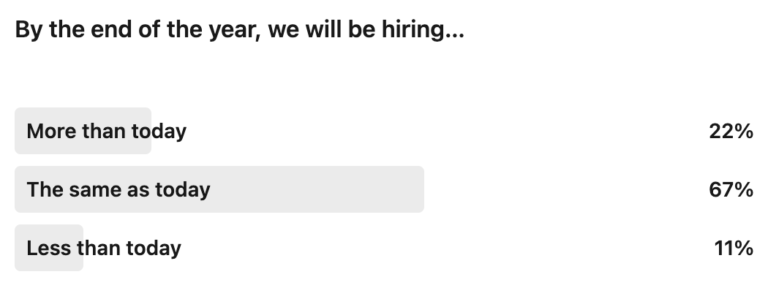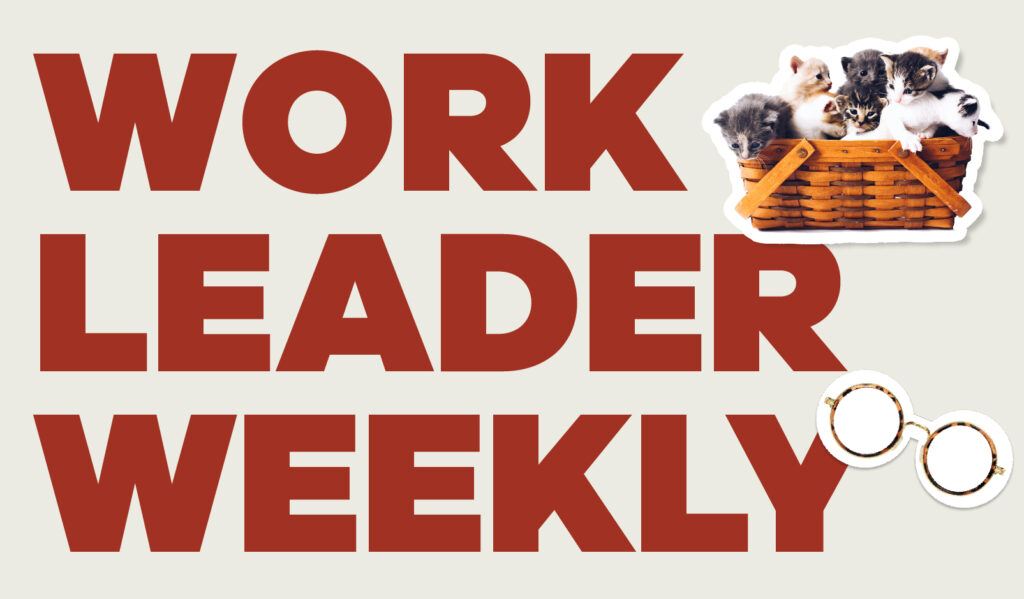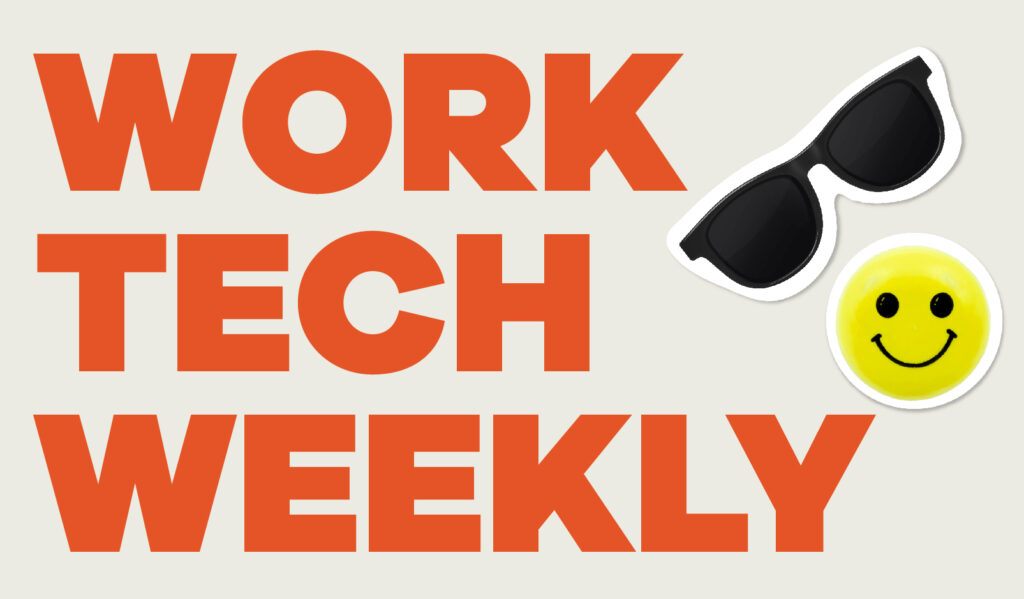Hello.
June 1 is the first day of LGBTQ Pride Month and, in the U.S. at least, we’re still having a conversation and seeing lawmaking that seems mostly focused on reducing rights instead of celebrating the decades of hard-fought wins that preceded the commemoration. Between banning queer stories in school libraries and the expansion of anti-trans legislation, these issues have come to work, too. In this week’s newsletter, we cover how companies should avoid rainbow washing this month, why non-competes keep taking a beating, and why women are still leaving the workforce. But first, the important role of managers in an AI-focused world.
Let’s jump into it.
Taking good managers over good AI
While we contemplate AI ushering in the end of the world as we know it, consider a much more relevant issue to most of us: Do you like your boss? Do they make your job easier or more difficult? If your boss were to leave, would it change your life for the better? For the worse?
As companies look to balance automation, AI, and people, we’ll need better-trained managers. In fact, the ongoing transformation of the workplace demands managers who can competently navigate numerous gray areas and ethical quandaries, all while helping themselves and their people build new skills for the future.
Sounds easy enough, right? Yet, we know that when people leave organizations or quit in place, it’s more attributable to bad management than bad employees. We’ve known this for years — yet the management skills gap continues to grow.
That’s disastrous for organizations looking to make their way through a chaotic and uncertain future. Better-trained managers can help ease the burden of change management, fill in gaps when senior leaders can’t anticipate issues, and create micro-cultures inside of organizations that can navigate niche challenges.
As everyone looks to jump on the next new AI trick, they often fail to invest in foundational skills for their most important leaders. Sure, it lacks the sexiness of AI and it’s much more difficult to develop your managers than it is to jump on the next tech fad. In a world where everyone is wondering what skills will be evergreen, building leadership and management skills seems like a safe, multi-decade bet.
People understand this. But organizations still fail to act. If your organization is doing deep dives into AI but still has significant management deficiencies, I’m not telling you that a company can’t do both. But I’d certainly prioritize one over the other. You can guess which.

Weekly LinkedIn poll result
 The practical optimism I sensed at ERE continues in our poll question from last week. Yes, most people see the status quo, but there’s more optimism that hiring will increase by the end of the year.
The practical optimism I sensed at ERE continues in our poll question from last week. Yes, most people see the status quo, but there’s more optimism that hiring will increase by the end of the year.
I think most people would feel pretty good if this were the outcome this year, but I am hopeful that conditions can improve even more.

Quick hits from around the web
What else is happening?
- Noncompete Agreements Violate US Labor Law, Official Says. My prediction: Non-competes will be relegated to $500k+ earning, non-ownership employees. A niche within a niche that will be rare. (Reuters)
- Return to Office: How COVID-19 and Remote Work Reshaped the Economy. Financial security may not be on the top of the list of ways COVID changed the world, but maybe it should be. (Princeton University Press)
- EEOC Updates COVID-related Guidance for Employers as the Feds Declare an End to the Public Health Emergency. A practical guide for organizations transitioning accommodation approaches due to the end of the public health emergency. (Lexology)
- Employees Who Spent Big on Pandemic Home Offices May Not Want to Leave Them. As someone who spent the first half of the pandemic building an office in his garage, it’s definitely me. (HR Brew)
- WeWork’s Woes Show Return to Office Is No Party. WeWork spaces aren’t an actual office, making potential advantages and pitfalls different from traditional return-to-office pitches to employees. (The Washington Post)
- The Importance of Power Skills in Employee Development. Looking for a skills development opportunity that will last? Power skills should be part of your mix. (Personnel Today)
- Why Are Women Still Leaving the Workforce? Deloitte research found that burnout and flexibility are driving women to reduce their load at work or leave altogether. (HR Dive)
- The Class of 2023 Enters the Workforce. Best of luck to a new class of graduates joining the workforce full-time and their unique (and similar) challenges. (Marketplace)
- Workers Aren’t Relocating for New Jobs Anymore. The rate of relocations has dropped to 1.6%, the lowest we’ve seen since we started tracking the number. It’s not just remote work, either. (Minneapolis/St. Paul Business Journal)
- What Does the Future of Employee Retention Look Like? More evidence on the advantages of investing in managers. (BenefitsPRO)
- Coca-Cola on Leading with Principle, Not Policy. If large companies like Coca-Cola can do this, so can any organization that wants to put more emphasis on shared values rather than policies. (Unleash)
- What Target’s Controversial Pride Month Dustup Tells HR About ‘Rainbow Washing.’ While there’s been a lot of talk about Target’s reputation as a retailer, how do their actions impact them as an employer? (HR Executive)
A CDC conference that was a superspreader event
If you would’ve told me three years ago that the CDC would hold a conference with 1,800 attendees, less than a third would be wearing masks, and that attendees inevitably got sick, I would have told you that the writers of The Onion were getting lazy. Yet, here we are, a very real story:
The tally of people infected with the coronavirus after attending a high-profile Centers for Disease Control and Prevention conference in April has risen to at least 181, the agency reported Friday. No one was hospitalized.
The CDC’s Epidemic Intelligence Service officers and alumni — the disease detectives deployed to identify and fight outbreaks — met April 24-27 at an Atlanta hotel. The conference drew 1,800 in-person attendees, the first in-person Epidemic Intelligence Service gathering in four years. Like many conferences, it was crowded, with much face-to-face contact, many events held in small rooms and lots of socializing, according to attendees. About 70% of participants who responded to a CDC survey said they did not wear masks at the event.
It’s a great example of their work in action, just not in the way they originally thought.

That’s it for this week!
Lance




